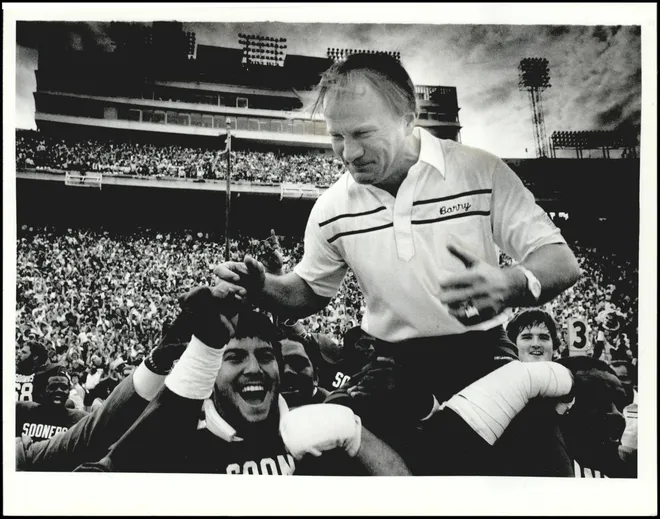Barry Switzer is a name that resonates with power, charisma, and winning—lots of winning. In the grand theater of football, few figures have managed to dominate both the collegiate and professional stages the way Switzer did. A legend at the University of Oklahoma and a Super Bowl-winning coach for the Dallas Cowboys, Switzer’s coaching career reads like an epic, packed with triumphs, controversy, and an unrelenting drive to win. He didn’t just coach football; he rewrote the rules of success, building dynasties and leaving behind a legacy that still echoes through the halls of Norman and the turf of AT&T Stadium.
Born on October 5, 1937, in Crossett, Arkansas, Barry Switzer’s story is a true American tale of grit and rise through the ranks. Growing up in a tough household, Switzer found refuge and discipline in football, eventually walking on at the University of Arkansas and becoming co-captain of the team. His early coaching years began humbly as an assistant at Arkansas before he joined Oklahoma’s staff in 1966 under Chuck Fairbanks. But it didn’t take long before Switzer’s brilliant football mind and natural leadership started turning heads.
When Fairbanks left for the NFL in 1973, Switzer was promoted to head coach of the Oklahoma Sooners. From that moment on, the college football landscape would never be the same. Switzer inherited a strong program, but he elevated it into an unstoppable juggernaut. His revolutionary wishbone offense shredded defenses and left opponents gasping for air. In his first year, he led the Sooners to an 10-0-1 record. And that was just the beginning.
Under Switzer’s command, Oklahoma became a powerhouse. He won three national championships—in 1974, 1975, and 1985—and 12 Big Eight Conference titles. His teams were fierce, fast, and physical, often steamrolling opponents into submission. But it wasn’t just about the X’s and O’s. Switzer had a rare ability to connect with his players, especially those from tough backgrounds. He built a culture of belief, loyalty, and brotherhood. Recruits didn’t just come to OU for the trophies—they came to play for Switzer.
Yet, for all the on-field success, Switzer’s time at Oklahoma was also marred by controversy. His program was often under the microscope of the NCAA, and several incidents involving player misconduct and recruiting violations would eventually contribute to his resignation in 1989. But even those turbulent chapters couldn’t erase what he had accomplished. He left Norman with a 157-29-4 record—one of the best winning percentages in college football history. More importantly, he left with the respect of players who would follow him for life.
When Barry Switzer stepped away from the college game, most assumed he was done coaching for good. But football had other plans for him. In 1994, after Jimmy Johnson’s departure and a brief and bumpy tenure under Barry’s former college rival, Jerry Jones turned to Switzer to coach the Dallas Cowboys. It was a controversial hire. Many questioned whether Switzer, known for his college success but not his NFL experience, could manage the personalities and egos of a star-studded Cowboys team. But once again, Switzer proved the doubters wrong.
Taking over a team loaded with talent—Troy Aikman, Emmitt Smith, Michael Irvin, and one of the most dominant defenses in NFL history—Switzer was walking into a high-pressure situation. Expectations were sky-high. He was expected not just to win, but to keep winning in the shadow of Jimmy Johnson’s legacy. Switzer didn’t flinch. He brought his trademark swagger, calm confidence, and player-first philosophy to the locker room. And the players responded.
In just his second season, Switzer led the Cowboys to Super Bowl XXX, where they defeated the Pittsburgh Steelers 27-17. It was an emotional and historic victory—not just for the team, but for Switzer personally. With that win, he joined an elite group of coaches who have won both a national championship and a Super Bowl. At the time, only one other coach—Jimmy Johnson—had accomplished that feat. It was a crowning moment for a man who had already conquered college football and now cemented his legacy in the NFL.
But Switzer’s NFL journey wasn’t without its challenges. He clashed at times with management, dealt with off-field distractions, and faced intense media scrutiny. Still, in four seasons as the Cowboys’ head coach, he compiled a 40-24 regular season record and made the playoffs three times. In the cutthroat world of the NFL, that’s no small feat. His leadership style—relaxed but unwavering—helped Dallas remain competitive even as the team’s roster and chemistry began to change.
After stepping down in 1997, Switzer didn’t fade into obscurity. He remained a vocal and beloved figure in both Oklahoma and Dallas, frequently appearing on television and radio, always offering insight, humor, and a touch of mischief. He authored a memoir, Bootlegger’s Boy, where he opened up about his personal life, triumphs, and trials, further endearing himself to fans and critics alike. His candor, charm, and storytelling ability made him one of football’s most compelling personalities.
Beyond the stats and trophies, what truly sets Barry Switzer apart is his impact on people. Players loved him. Many credit him not only for their football success but for their personal growth. Switzer had a unique gift for turning raw talent into polished greatness, for seeing potential where others saw problems, and for forging bonds that extended far beyond the football field. He coached with passion, compassion, and conviction.
In the broader history of football, Switzer’s dual success at the collegiate and professional level places him in rarefied air. He’s not just a winner—he’s a pioneer, a motivator, a cultural icon. He showed that greatness isn’t confined to one level or one system. It’s a mindset, a way of life. Whether on the sidelines at Owen Field or in the glare of Super Bowl Sunday, Switzer brought the same fire, the same belief, and the same bold style that made him unforgettable.
Today, Barry Switzer stands as a living legend—still sharp, still outspoken, and still beloved by generations of football fans. His contributions to the game are indelible, his legacy secured not just by championships, but by the hearts he touched and the players he inspired. In an era where coaches are often defined by schemes and stats, Switzer remains proof that heart, authenticity, and belief can be just as powerful.
Barry Switzer’s story isn’t just one of football—it’s one of resilience, redemption, and relentless pursuit of greatness. From the dusty fields of Arkansas to the pinnacle of the NFL, he charted a path few have dared to follow and fewer still have matched. He is, without question, one of the most decorated, dynamic, and unforgettable coaches in the history of the sport. And for fans of the Sooners and the Cowboys alike, he’ll always be much more than a coach—he’ll be a legend.



